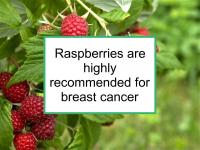Raspberries (Rubus idaeus) have strong antioxidant and anti-inflammatory properties. Raspberries are a very good source of cyanidin-3-glucoside, ellagic acid, pelargonidin, and salicylic acid, and a good source of dietary fiber and rutin, all of which have been shown to have chemopreventive properties.
Raspberries are also a source of some malvidin and quercetin. Black raspberries (Rubus occidentalis) appear have higher levels of most chemopreventive micronutrients than red raspberries.
Breast cancer-related effects of eating raspberries
Animal studies
Raspberry powder has been shown to have antiproliferative effects when fed to female rats prone to mammary tumors. Studies that have compared blueberry to black raspberry diets in rats have reported that while blueberries result in lower tumor volume than black raspberries, black raspberries are more effective in delaying the first appearance of tumors in rats implanted with estradiol (E2).
Raspberry anthocyanins
Raspberries are a rich source of a variety of anthocyanins, most importantly cyanidin, pelargonidin, and malvidin. These are closely-related plant pigments with chemopreventive properties that give the berries their rich color. Women in the highest quartile (fourth) of anthocyanin intake had significantly lower risk of breast cancer than those in the lowest quartile in one study. Anthocyanins have also been demonstrated to reduce doxorubicin chemotherapy-induced heart damage.
Cyanidins such as cyandin-3-glucoside have been reported to suppress angiogenesis by inhibiting tumor cell proliferation and migration. Cyandin-3-glucoside has been shown to reduce HER2+ cell proliferation and interfere with the viability and metastatic potential of triple negative (ER-/PR-/HER2-) breast cancer cells. Cyandin-3-glucoside has also been shown to enhance the treatment effects of trastuzumab (Herceptin) in HER2+ breast cancer cells and to heighten the efficacy of the chemotherapy drug cisplatin.
Pelargonidin has been shown inhibit the growth of ER+/PR+ breast cancer cells. High dietary intake of malvidin has been reported to be associated with reduced levels of systemic inflammation (as measured by CRP). Malvidin has also been shown to reduce the growth and proliferation of ER+/PR+ breast cancer cells.
Ellagic acid
Ellagic acid, which is found mostly in the tiny seeds of raspberries, has been reported to inhibit breast cancer in a variety of cell and animal studies, in part by inhibiting angiogenesis (a crucial step that makes invasive and metastatic malignant growth possible). For example, ellagic acid has been shown to reduce proliferation of ER+/PR+ breast cancer cells. In addition, ellagic acid has been found to be effective in the prevention of estrogen-induced mammary tumors in rats.
Ellagic acid has also been found to increase the sensitivity of ER+/PR+ breast cancer cells to radiation while reducing damage to normal cells, thereby potentially enhancing the treatment effects of radiotherapy. In addition, ellagic acid has been reported to reduce doxorubicin-induced neurotoxicity and cardiomyopathy. Also, pretreatment with ellagic acid has been shown to sensitize cancer stem cells to cisplatin treatment by increasing DNA damage and impairing the DNA repair mechanism of the cancer stem cells.
Additional comments
Non-organic raspberries must be washed very thoroughly to remove pesticide residue. Loganberries are a hybrid cross between between blackberries and raspberries.
Raspberry supplements
Raspberry ketone (also known as rheosmin or frambinone) is the main aroma compound of raspberry fruit. The safety and efficacy of raspberry seed and raspberry ketone supplements has not been established. The levels of raspberry ketones in dietary supplements sold in the U.S. exceed the maximum recommended for food and fragrance products.
One study reported that raspberry ketone supplement administered to rats at high doses appeared to have harmful effects (in the form of cardiotoxicity and effects on reproduction/development). The bottom line is that additional toxicology studies are required to determine safe concentrations of raspberry supplements.
Sources of information provided in this webpage
The information above, which is updated continually as new research becomes available, has been developed based solely on the results of academic studies. Clicking on any of the underlined terms will take you to its tag or webpage, which contain more extensive information.
Below are links to 20 recent studies concerning this food and its components. For a more complete list, including less recent studies, please click on raspberries.
